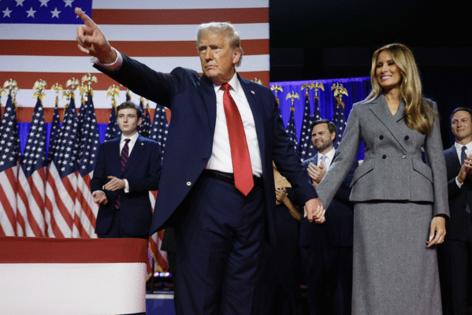Commentary: After 2024, Republicans ought to want to abolish the Electoral College too
Published in Op Eds
Jan. 6 this year marked not just the anniversary of the violent assault on the U.S. Capitol four years ago, but the actual counting of the electoral votes in Congress (by the loser of the presidential race, Vice President Kamala Harris).
Last month, three Senate Democrats presented a bill to abolish the Electoral College. It’s a pity they couldn’t secure a couple of Republican cosponsors. Because it’s quite conceivable this time around that Donald Trump might have decisively won the nationwide popular vote – but nevertheless lost in the Electoral College. The same thing that happened to Democrats in 2000 and 2016 might well have happened to the GOP in 2024.
Let’s take a look at the math. If candidate Harris had held the line in her three “Blue Wall” states, Wisconsin, Michigan, and Pennsylvania, she would have captured the presidency. Instead, she lost all three. But by how much?
In Wisconsin, about 30,000 votes. In Michigan, about 80,000 votes. In Pennsylvania, about 120,000 votes. Grand total? About 230,000 votes.
That’s not as close as the 78,000 votes which, if flipped, would have given Hillary Clinton an Electoral College victory to accompany her 2.9 million popular vote triumph in 2016. That’s not as close as the 43,000 votes which, if flipped, would have stolen from Joe Biden his Electoral College victory after his whopping 7 million popular vote triumph in 2020. But this time, around 230,000 votes, if flipped – less than 0.15% of 155 million cast nationwide – would have stolen from Donald Trump the Electoral College victory he legitimately earned with his popular vote triumph of nearly 2.3 million votes in 2024.
That’s three elections in a row now where the clear winner of the popular vote easily could have lost or did lose the presidency!
Republicans should recall, too, that the 2000 Bush v. Gore race obviously might have gone the opposite way. Gore could have lost the nationwide popular vote by 543,895 votes yet won Florida by 537 votes – and consequently the presidency – rather than, as it actually happened, the other way around.
So how about it, GOP? How about we work together to get rid of the thing once and for all? Because the Electoral College effectively disenfranchises all, repeat all, of the residents of all 43 of the non-swing states. I vote for the Democratic presidential candidate every four years from my home in California. My misguided brother votes for the Republican presidential candidate every four years from his home in California. But both of us know that our presidential votes really don’t count — really don’t matter. Really cannot possibly affect the outcome.
Yet voters in the seven swing states – red and blue alike – know their votes matter extraordinarily. Think how much this distorts the actual final national vote count. Who knows how many potential voters in those 43 states, because they understand this reality, don’t bother to show up? Why should they, when the presidential candidates campaign there approximately never? The Electoral College isn’t just awful because it has burned Democrats twice in the past quarter century. The Electoral College is awful because it burns our democracy every four years without fail.
Fortunately, getting rid of this civic atrocity does not, repeat not, require amending the U.S. Constitution. Article II, Section 1 says that each State shall appoint its allocated Electors “in such Manner as the Legislature thereof may direct.” State legislatures do not have to award all of their electors to the winner of the popular vote inside their state. They could instead assign them in proportion to how the vote was split in that state.
That’s one of the imaginative plans pushed by the group Make Every Vote Count. (Nebraska and Maine do just that already.) Or they could award all their electoral votes (in an “interstate compact” with other states) to the winner of the popular vote not inside their own state, but inside the United States. That’s the brilliant plan pushed by the group National Popular Vote.
“A republic, Madame, if you can keep it.” So said Benjamin Franklin to a Philadelphia matron who asked what had emerged from the deliberations inside Independence Hall in 1787.
The 250th anniversary of the birth of our country, July 4, 2026, is only 18 months away. What better moment to seize this opportunity to correct this monstrous flaw in our American democracy?
Let’s compete on a level playing field for hearts and minds and votes across all the fruited plain. Let’s choose our national leader in roughly the same way they do in most other countries and exactly the same way we choose every other elected official in our country. One person. One vote. And one United States of America.
____
Tad Daley is President of the Americans for Democratic Action Foundation of Southern California, founded nationally in 1947 by Bayard Rustin, Hubert Humphrey, and Eleanor Roosevelt. Daley has served as a policy advisor, speechwriter, and/or coauthor with three members of the U.S. House and two U.S. Senators. He is the author of the book "APOCALYPSE NEVER: Forging the Path to a Nuclear Weapon-Free World" from Rutgers University Press. @TheTadDaley
_____
©2025 The Fulcrum. Visit at thefulcrum.us. Distributed by Tribune Content Agency, LLC.




























































Comments